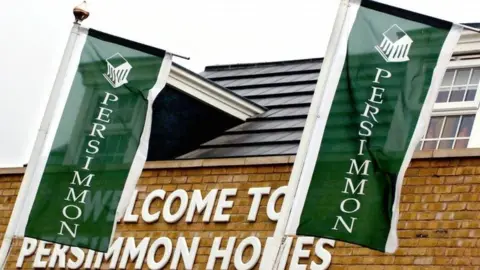Persimmon hit by investor revolt over executive pay
 PA
PAPersimmon has narrowly avoided defeat over a plan to pay its chief executive £75m following a shareholder backlash.
At its annual meeting, 48.5% of investors' votes were cast against the housebuilder's remuneration report.
Chief executive of Persimmon, Jeff Fairburn, was initially due to receive £110m but that sum was later reduced considerably.
The company said "we recognise that a sizeable number of shareholders remained concerned" about the pay deal.
Some 51.5% of vote cast at the AGM backed the remuneration plan while 30.9% abstained.
At the meeting, one of Persimmon's biggest shareholders - Aberdeen Standard - made a strident attack against the pay and bonus scheme.
The fund manager said the company's decision to reduce Mr Fairburn's remuneration to £75m did not come "close to acceptable".
Persimmon chairman Nigel Mill told the meeting: "This could have all have been handled better ... it should have been."
In his written statement to the meeting, Aberdeen's corporate governance chief Euan Sterling acknowledged that Persimmon's board had presided over a very successful period for the company.
"But being a company director, and in particular a chief executive, requires more," he wrote. "It requires a broader context. It requires a personal motivation that goes beyond simply amassing a fortune.
"It requires an understanding of where the company sits within the society within which it operates. Little of that is evident currently at Persimmon."
Aberdeen Standard has a stake of about 2.3% in Persimmon.
 PA
PADuring the meeting, Mr Mill apologised "unreservedly" to shareholders over the housebuilder's handling of executive pay.
He said: "I recognise that there has been significant strength of feeling from some shareholders over this issue. And so please let me take this opportunity to apologise unreservedly to our shareholders.
"It is a matter of profound regret that we got to the position where we had a company with an exceptional management team, delivering exceptional, market-beating performance, that has been overshadowed by a row over pay."
Mr Mill also pointed out that shareholders voted through the pay deal in 2012 and that no-one could have predicted that the "performance of the business would be so good over such a long period of time".
Mr Fairburn was initially due to receive £100m, but later agreed to hand back £25m in bonuses.
The Church of England had also promised to vote against the company's remuneration report.
